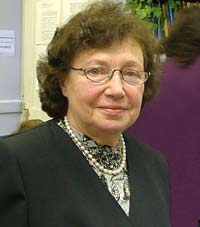|

Heard of Department
of Child Language,
Prof.Stella N.Ceytlin, PhD,DSc
HOME
RUSSIAN SITE
|
|
|
|
LONG-TERM SEMINAR ON ONTOLINGUISTICS
(CHILD LANGUAGE LINGUISTICS)
Historical background
The seminar exists for over ten years. At the beginning it was a research group at the Department of Russian for Non-philologists, A.I.Herzen Russian State Pedagogical University. When the Department of Child Language appeared in 1991, the seminar moved to the pre-school Education Faculty. In 1993 the laboratory for the study of child language was open, and we started the creation of the child language database. During the last 6 years the seminar has been sponsored by the Russian Foundation… . The seminar unites specialists on language acquisition from different towns of Russia (St. Petersburg, Moscow, Cherepovets, Archangelsk, Ussurijsk, Orel, Perm’, Belgorod, Barnaul). Scientists working abroad also take part in the seminar (Berlin, Helsinki, Vienna, Boston). After the St. Petersburg Linguistic Society was organised in 1998, the seminar became one of its sections.
Conferences are organised every year (every odd year in St. Petersburg, every even year in one of the Russian towns). The conferences have taken place in Cherepovets three times, and one time in Orel. Several student conferences have been held already. Many participants of the Seminar are as well members of the IASCL (International Association for the Study of Child Language); S.N.Ceytlin represents Russian in the executive committee of this organisation.
The main activities
Ontolinguistics (linguistics of child language) is a young and widely developing discipline. More than any other field of study it needs co-ordinating of different problems in scientific research, analysing of existing conceptions, discussing of the methods of data collection and analysis, exchanging of data, etc. This has long been realised by the international community, which is proved by the organising of the International Association for the Study of Child Language. The IASCL is successfully working on the problems listed above.
In Russia the function of such a co-ordinating centre is being performed by the Seminar on Ontolinguistics.
Different specialists in child language studies take part in the Seminar work (mainly linguists, but also psychologists and specialists in logopedics – for the last few years).
Principal activities of the Seminar are as follows:
(1) creation, enlargement and maintenance of the Database on Child Language, which is represented by audiotapes of spontaneous children’s speech, parents’ diaries, experimental data, etc.;
(2) co-ordination of scientific studies in theoretical ontolinguistics, held in Russia;
(3) development of applied ontolinguistics issues, which implies co-operation with specialists in methodology of speech development, in teaching children their native and foreign languages, in logopedics, in psychology;
(4) contacts with foreign researchers of child language, with the International Association for the Study of Child Language (IASCL), with the International Association for Applied Psycholinguistics (ISAPL), etc.;
(5) development of theoretical grounds for the new academic discipline (child language linguistics) and for the specialisation in ontolinguistics (at the moment this specialisation is included in the list of philological specialisations, number , the State University of Cherepovets has enrolled students for this specialisation;
(6) organising of annual conferences and workshops in particular problems of ontolinguistics;
(7) publication of the Seminar Proceedings (one volume per year), conference proceedings, diaries, phonetic readers, bibliographies on child language studies, etc.;
(8) Creation of independent branches of the Seminar in different cities and towns of Russia.
Conferences are held annually, the proceedings are published (cf. “Issues in Child Language Linguistics – 1999”, St. Petersburg; “Issues in Child Language Linguistics – 1998”, St. Petersburg – Cherepovets; “Issues in Child Language Linguistics – 1997”, St. Petersburg; etc.). .
One of the main activities of the Seminar is the support of young researcher (undergraduate and postgraduate students). The special long-term young scientists workshop has just been organised; it is planned to discuss the projects of students from the A.I.Herzen Russian State Pedagogical University and the State University of St. Petersburg working in the field of child language linguistics.
During the time of the Seminar activity we have published 8 volumes of scientific articles (3 volumes of the papers of young scientists included), 6 books of conference proceedings, 5 volumes of mothers’ diaries and spontaneous speech transcriptions, a book with the bibliography of the Russian works on child language (1620 entries), and more than 10 paperbacks with methodical indications for students attending the course of child language linguistics. A lot of attention is paid to the children’s innovations that are of great interest for linguistic theory. There have been two editions of the dictionary “Children are speaking”, which includes 5 types of innovations. Some publications are made together with western partners – the dictionary mentioned above should be published in Frankfurt (Germany); Prof. Sappok (Bochum) took part in the publication of the phonetic reader “The Speech of Russian Children”.
All the materials are distributed within Russia, they can be found in the principle libraries of the country and in the libraries of many universities and pedagogical institutes.
The Seminar members participate in international congresses on child language and psycholinguistics, and in various conferences abroad.
The important task for the participants of the Seminar is developing of the scientific grounds of the new academic discipline “child language linguistics”, which is at present included in the curriculum of several Russian institutions of higher education. It is obvious that the progress in scientific research in this field will lead to the further promotion of this academic subject that has long been taught to students in the universities abroad, and has not yet been as widely acknowledged in Russia.
| |

![]()
![]()
